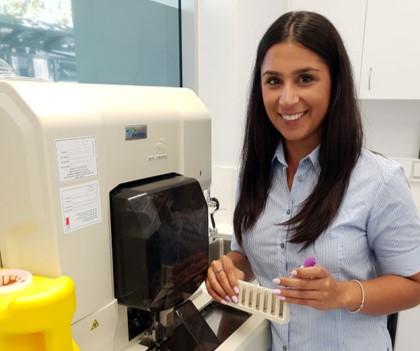South Australian medical scientist Georgina Sassine loves her job, in particular enjoying the detail orientated exploration into solving the complexities of disease and the human body.
“I love being able to get a behind-the-scenes look into what is happening to the body when it is affected by different conditions or diseases,” said Georgina.
She began her medical career in university training to become a doctor who would treat patients, but she soon realised her passion was for the analysis of an illness or condition.
“I have always been passionate about a career in healthcare, and my dream has always been to become a doctor – however, having started working in pathology after finishing my degree, I have fallen in love with it. I love the fast pace of working in the hospital labs, I hope to continue to learn and develop my skills so that eventually one day I could become a Team Leader and be in charge of my own lab.”
Two years to the day after she began a technical assistant role at Clinpath Pathology, Georgina accepted a role within the hospital laboratory system as a medical scientist.
“There isn’t one part of the pathology process of accepting and analysing a specimen which you aren’t involved in, as you start to learn more about the person, who is the patient, via their doctor ordering tests.”
She loves to take note of what the clinical notes say and what tests are being ordered by the doctor to help them diagnose the patient. This is why she chose to work in pathology.
Many of the practical skills and scientific knowledge used by medical scientists are the same as research scientists searching for cures. The difference is that medical scientists apply that know-how to results that can help someone here and now, and don’t need to wait for years to know that they are helping their patients get better.
It is detail orientated, problem solving and investigative work which Georgina enjoys. Each day she is presented with a raft of scenarios which all call on different skills, her energy as a young pathology professional combined with the scientific training and experience gained working in the laboratory so far.
There are many areas of science where women are under-represented and many initiatives to encourage young women to study science. Georgina says pathology is a great career and she has many inspiring women in her laboratory;
“At work I am surrounded by such successful, smart and professional women who really own what they do and are so supportive of each other. I feel so lucky to have such excellent role models, and hope to one day be as smart and successful as they are!”
Down time is just as hectic for Georgina catching up with her loud, large social group of family and friends, and working another detailed skill on the face – as a makeup artist!
“My family and friends had no idea what pathology was before I started working in the industry! The only thing they associated with pathology was waiting to get test results back. They did not understand all the processes and the testing requirements and all the other things that take place from when their blood is taken to when they go back to the doctor to get their result. But now, I think they have a greater appreciation for what we do and the time constraints we often work under to ensure results are available as soon as possible.”

